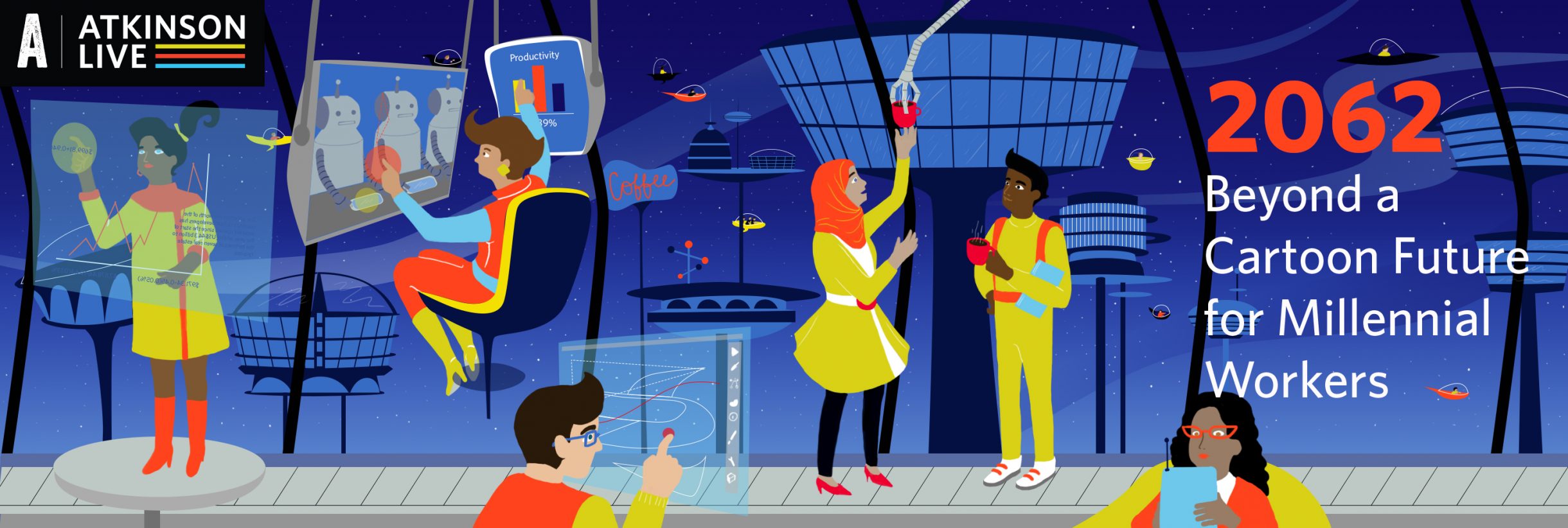
In front of a live audience on Wednesday, January 23, 2019, Ausma had a seriously funny conversation about inclusion, technology and power with U.S. comedian Hari Kondabolu and Canadian Roots Exchange’s Max FineDay. The podcast includes cameo appearances from the cast of The Jetsons, the first colour cartoon series which aired in 1962 and set in 2062.
Ausma, Hari and Max talk about bosses and workers, tech for lifestyles and livelihoods, and how race, money and gender colours everything for millennials. They dish about the antics of a space-age family and workplace conceived 56 years ago — what’s changed, what’s frozen in time, and what we can do about the future today. Heads up! This episode contains language that some people may find offensive.
Hari Kondabolu is a Brooklyn-based comedian, podcaster and writer. His work includes Netflix special Warn Your Relatives, his critically-acclaimed 2017 documentary The Problem with Apu, and two comedy albums, Waiting for 2042 and Mainstream American Comedy. He has co-hosted two popular podcasts, Politically Reactive with comedian W. Kamau Bell and The Kondabolu Brothers.
Max FineDay is a nêhiyaw activist from the Sweetgrass First Nation. He works with Indigenous and non-Indigenous youth on reconciliation as the Executive Director of the Canadian Roots Exchange.
On Inclusion
On the Jetsons, Rosie is only allowed to stay because she is ‘free’ – which says a lot about how we value (or don’t) domestic work. The National Domestic Workers Alliance in the US is challenging this devaluing of care work and fighting for decent work for domestic workers. Check out their new portable benefits program, Alia, and the Caring Across Generations campaign.
#JetsonsSoWhite? Matt Novak explores the startling lack of diversity in the Jetsons.
Racialized workers make up 29 percent of the labour market in Ontario but continue to face higher unemployment rates and significant wage gaps – read more about it in this report from the Canadian Centre for Policy Alternatives.
Hari shouted out Aparna Nancherla as one of his fave comedians – check out her work.
One of Hari’s comedy albums, Waiting for 2042, is named for the year that white people will be a minority in the United States. In Canada, almost half of Canadians will be immigrants or children of immigrants and one-third of our workforce will be people who belong to a visible minority by the year 2036. See the details from StatsCan here.
The Jetsons was produced to broadcast in colour using the latest technology at the time but in 1962 less than 3% of American households had access to it. The show in black and white was entirely different – and kind of scary! See it for yourself in 50 Years of the Jetsons: Why The Show Still Matters by Matt Novak for The Smithsonian.
On Technology
Max talked about the precarious nature of work for young people – this piece by Anne Helen Petersen earlier this year, How Millennials Became The Burnout Generation, made waves for speaking some serious truth to millennials’ work, debt, and life stress. Two follow ups worth reading too: This Is What Black Burnout Feels Like and Here’s What “Millennial Burnout” Is Like For 16 Different People.
Hari asked the question, are humans going to be in the picture of our workforce? It’s a good question. In the Workforce of the Future survey, a third of workers worldwide expressed concerns about losing their jobs to automation.
We had a little bit of confusion around the Sharing Economy in our “Take It or Leave It” segment – are we talking Uber or transforming our economy? Joey Eschrich points out we rarely talk about a future without capitalism.
On Power
“These should be salad days for the union movement: inequality is rising, full-time employment is declining and real wages are going backwards. There’s lots to campaign on, but union membership continues to fall” – why is that? In this Australian radio program, experts (including one of our fave progressive economists Jim Stanford) explore the future of employee representation.
Hari talked about the need for a power shift in entertainment – hiring people of colour and LGBTQ folks as producers, directors, writers, and actors. In this Vox piece, Abbey White talks to diversity consultants about how to get representation right.
For Max, Canada has always been The Man. During Canada150, he reflected on the promise for meaningful reconciliation lead by youth, to ensure that the next 150 years are brighter.
When people get fed up, they get organized, and they get results. Ausma shouted out the Fight for $15 and Fairness – check out their continuing work.
Max is inspired by “young people who who just want to have what our ancestors envisioned and that’s peace, prosperity, and mutual respect.” Check out the work he does with young people at Canadian Roots Exchange.
Hari reflected on the inspiration he has gotten from art recently – both If Beale Street Could Talk by Barry Jenkins and the United Shades of America by W Kamau Bell.
Etcetera
Hari and Ausma’s exchange about Canadian democracy reminded us of our fave explainer from Rick Mercer – it’s an oldie but a goodie.
In our research for 2062, we came across this awesome BBC podcast, Flash Forward, that talked about the “amazing possibilities – and downsides – that the future holds.” This episode on a future with no farm workers was especially interesting. It looks at the racist and anti-worker origins of futurism in agriculture, cost pressures that have led to automation, and whether or not agriculture in the US has been reduced to as few workers as can be.

